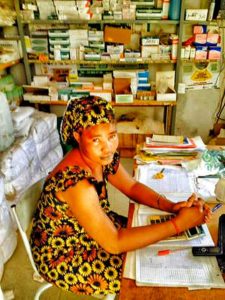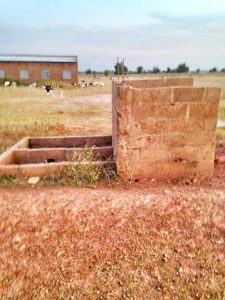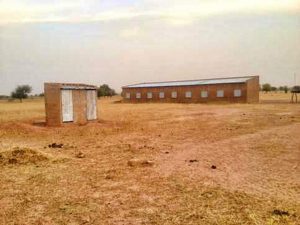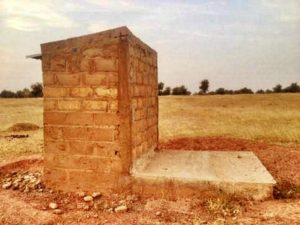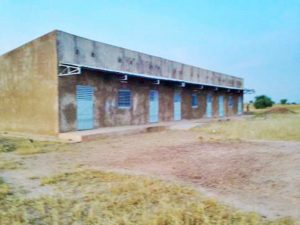This project has been completed under the direction of Peace Corps Volunteer Emma Martz.
To read about the beginning of the project, CLICK HERE.
Emma’s conclusion summary:
Scope of the Project
The Loumbol Samba Abdul Middle School Latrine and Hand Washing project were intended to provide a latrine for the local middle school as well as teaching the community members the importance of water cleanliness, sanitation, and hygiene in daily life. Before this project, approximately 120 students and 10 teachers had no facility to use a bathroom during the school day. The local middle school is a 15-minute walk from the village center and usually, kids and teachers are at school from early in the morning until mid-day. The fact that no toilet existed for such an establishment was not only a burden to students but also a sanitation and hygiene issue.
With the help of prominent village men, including shop owners, masons, and school teachers, the latrine was half-built, but they ran out of resources to complete the project. I reached out to Water Charity for the funding needed to complete and rehabilitate the non-functioning bathrooms.
A goal achieved throughout this project was performing a baseline survey for the entire village of Loumbol Samba Abdul to gain an understanding of the community’s knowledge in relation to water, sanitation, and hygiene.
In addition, community members were taught WASH practices and techniques that would overall improve their health. These practices include: proper hand washing techniques, how to build a hand washing station, how to properly treat unclean water, how to make your own soap, and what to do when children under 5 have diseases relating to poor hygiene. We were able to reach approximately 50 women over the course of two different information sessions. Also, over 10 houses successfully built and maintained hand washing stations.
Not only this, but a fully-functioning latrine for the middle school was created and is in use currently. After talking with students of the middle school, many were extremely appreciative of the new addition. My host sister Ramata Diallo, a student at the middle school, talked about the bathrooms by saying “Hade duus arii toon, ina hewi caadeele kono jooni semori. Eleveaable cokklaani fadde haa min njiipiima pur huutoraade duus nande fof.” Roughly translated, she said, “Before the bathrooms came, there were many problems but now, it’s better. Students don’t need to wait to use the bathroom every day until the end of the school day.”
How the Work Progressed
The middle school bathroom started with the discussion with local mason Baydi Deh. He agreed to build the bathroom without cost, as long as materials were provided. I, therefore, had to go to the nearest town Ourossogui to buy all materials and transport them back. The construction began in March of 2015 with each part being completed over the course of a year. The reason for such an extended time frame for a simple project had to do with our mason taking a leave of absenceto his home village for four months. Also, the arrival of the rainy season delayed the construction progress. The walls and structure of the latrine were half-built before I arrived in Loumbol Samba Abdul, which was the first step in completion. After the walls, the toilet seats and pipes were installed, followed by the roof, doors, and patching of small cracks. The project was finally completed in January 2016, with the final touches on the roof.
End Result
The students of Loumbol Samba Abdul middle school now freely use the bathroom at their convenience every day. The bathroom has 2 stalls for females and males and is fully functioning. In addition to this bathroom being constructed, mothers from each household in the village have gained knowledge about the importance of water, sanitation, and hygiene which they can now pass on freely to others.Many of the teachers were grateful to have this addition to their work building. They had only positive reactions to the project and many proclaimed that the addition of toilets to a middle school was helpful to the everyday lives of students and teachers.
A small group of prominent community men was motivated by such a positive addition that many pooled funds to buy materials needed for an office for the teachers
We would like to thank Emma once again for completing this project.
